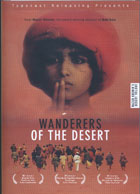
Wanderers of the Desert (Les baliseurs du désert) 1984
Distributed by Typecast Releasing, 3131 Western Ave., Suite 514, Seattle, WA 09121; 206-322-0882
Producer n/a
Directed by Nacer Khemir
DVD, color, 95 min.
College - Adult
Drama, Film Studies, Middle Eastern Studies, Storytelling
Date Entered: 05/15/2009
Reviewed by Linda Frederiksen, Washington State University, Vancouver, WAUsing the barren wilderness of North Africa as a backdrop, the film tells the story of a young teacher who arrives in an isolated and mysterious village. The sons of the village, drawn by an ancient curse, leave their homes to wander endlessly and ghost-like in the desert. A man spends 50 years digging for what may be a lost treasure. A haunted well, a garden of broken mirrors and a perplexing appearance of an empty boat are interwoven into the daily life of the crumbling but eventfully occupied village. By combining folklore, legend, and mysticism with pictorial desert and village landscapes, the movie has a distinctive mood and atmosphere that is both visually appealing and often compelling. In contrast, the acting and dialogue – in Arabic with English subtitles – seem stilted. Lacking a context or understanding about the stories, metaphors or tribal culture of the region, many audiences may also be confused or distracted by the frequently puzzling action, unfamiliar religious symbolism and numerous characters.
Produced in 1984 and recently released in DVD format, this film by Tunisian poet and filmmaker Nacer Khemir is the first piece in his Desert Trilogy series, which also includes The Dove’s Lost Necklace (1990) and Bab’Aziz (2006). Extra features consist of chapter divisions, photographic stills from the film and short trailers for other movies available from this distributor. Although perhaps not an outstanding film in and of itself, as an example of the director’s early work and as an introduction to a particular style of foreign narrative filmmaking, the film has merit as a starting point for further research or discussion.